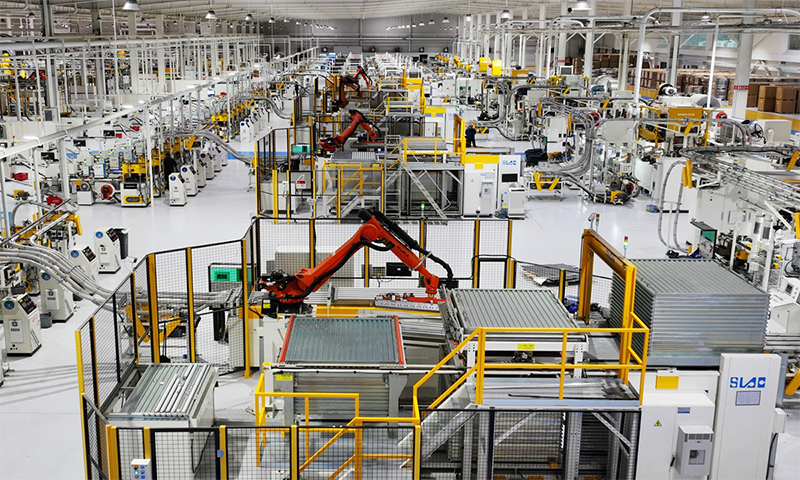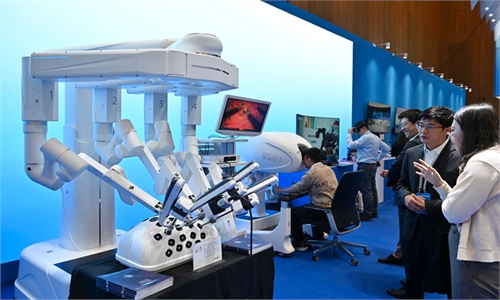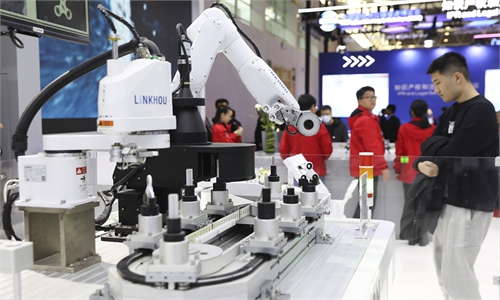China shifts focus to high-quality economic development, fostering emerging industries

Industrial robots are operating on an intelligent production line in a smart manufacturing enterprise in Yangzhou, East China's Jiangsu Province. Photo: VCG
China is taking efforts to cultivate new quality productive forces, signaling a move from high-speed to high-quality economic growth. The transition encompasses a broad spectrum of initiatives, showing concerted efforts in fostering emerging industries and upgrading traditional sectors of the economy.
In a series of press conferences held recently highlighting high-quality development, regional governments, such as North China's Beijing, East China's Zhejiang Province and Jiangsu Province underscored their commitments to industrial upgrade and new policies in fostering new quality productive forces.
Among the regions, Jiangsu is promoting the development of strategic emerging industry clusters, focusing on building a future-oriented industrial system, according to Xu Kunlin, Jiangsu Provincial Governor, during a press conference on Tuesday. "We are advancing the digital and smart transformation of manufacturing, aiming to solidify and expand the advantages of traditional industries."
Experts view this period as a critical phase in China's economic transformation, emphasizing the shift toward high-quality development with the construction of new quality productive forces being the key.
China's economic structure is undergoing transformation, moving from a focus on the quantity of development to prioritizing the quality of development, thereby promoting economic restructuring or optimization, Cao Heping, an economist at Peking University, told the Global Times.
The foundation of China's high-quality development and economic transformation remain solid. China's high-quality economic development is supported by its strong industrial base, vast market, and abundant capital and labor resources, said Li Xuesong, director of the Institute of Quantitative and Technological Economics of Chinese Academy of Social Sciences (CASS).
The press conferences have collectively spotlighted the development of new quality productive forces, with Jiangsu playing a crucial role. "Jiangsu aims to become a globally influential industrial technology innovation center, fostering deep integration between technological and industrial innovation," Xu Kunlin stated.
Jiangsu is placing a renewed emphasis on basic research and industrial upgrade, leveraging companies as the main source of innovation. This year, the province has established a special fund for basic research, amounting to 2.48 billion yuan ($342.7 million), aimed at supporting the provincial laboratory system and conducting basic research projects.
Furthermore, Jiangsu is focusing on the development of emerging industries, including hosting the Global 6G Conference 2024 in Nanjing, which will feature participation from international organizations, universities and core companies, with a focus on technological innovation, strategy and cooperation.
China's innovation capabilities and investments in research and development have pushed the high-quality development of its industries, achieving digital transformation of traditional industries and rapid development of high-tech industries, according to Shi Dan, director of the Institute of Industrial Economics under CASS.
In addition to local government initiatives, China's banking sector is also increasing its support for the development of new quality productive forces. As of the end of 2023, the Bank of China's loan balance for strategic emerging industries exceeded 1.9 trillion yuan, increasing by over 830 billion yuan, marking a year-on-year rise of 74 percent, according to media reports.
"This demonstrates our commitment to transforming the development of new quality productive forces into concrete actions for financial services to the real economy," stated Liu Jin, president of the Bank of China.


